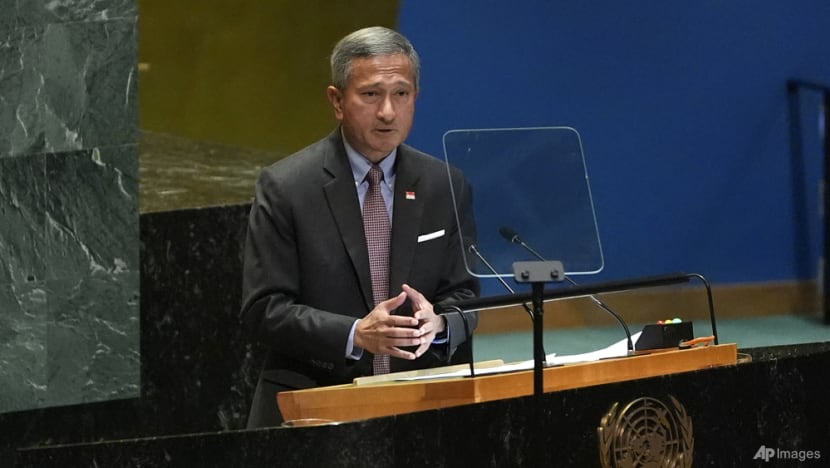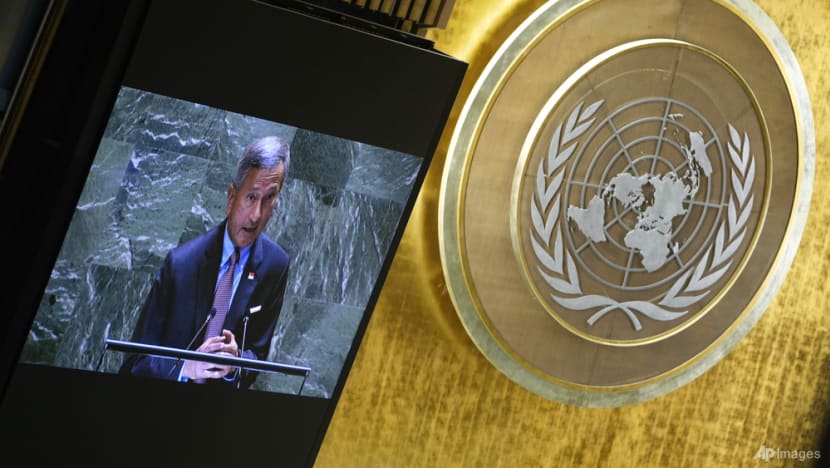Important to 'empower and transform' the UN so that it is future-ready: Vivian Balakrishnan
Singapore's foreign affairs minister also emphasised the need to reinforce the foundational role of the United Nations in maintaining international peace and security.

Singapore's Minister for Foreign Affairs Vivian Balakrishnan addresses the 79th session of the United Nations General Assembly, Saturday, Sept. 28, 2024. (AP Photo/Pamela Smith)

This audio is generated by an AI tool.
SINGAPORE: Singapore on Saturday (Sep 28) stressed the need to "empower and transform" the United Nations (UN) so that it is "future-ready" and capable of responding to emerging global challenges.
Delivering the country's national statement at the UN General Assembly, Minister for Foreign Affairs Dr Vivian Balakrishnan also underscored the need to transform global governance institutions to make them more representative and responsive, particularly to the needs of small states and developing countries.
He added that it is important to reform the UN and make it "more efficient, effective and responsive".
This includes reforming the UN Security Council to "reflect the contemporary realities" through an expansion in both the permanent and non-permanent membership categories, he said.
Among other things, there must be more opportunities for young people to engage in the work of the UN and to serve as "agents of change" to revitalise international cooperation, he pointed out.
It is also important to harness the power of digital technologies in a "safe and secure" manner, Dr Balakrishnan said.
REINFORCING UN'S FOUNDATION ROLE
In his statement, Dr Balakrishnan also emphasised the need to reinforce the foundational role of the UN in maintaining international peace and security.
"We must return to the basics - by reinforcing the foundational role of the UN in maintaining international peace and security ... We must restore respect for the rule of law and the UN Charter," he said.
This has underpinned global peace and security for the last 80 years, he added.
"We cannot allow recent violations of international law to become normalised," he said, adding that the war in Ukraine was a "flagrant violation of international law and the UN Charter".
The invasion of one country by another, under the pretext of historical errors and grievances, cannot be justified by any means, he said.
"If we allow the notion that 'might is right' to prevail, the world will become a very dangerous place, especially for small states," said the foreign affairs minister.
That is why Singapore and other small states have to consistently stand for compliance with, by all member states with international law and the UN Charter, he added.
"We as a small state, have no interest in taking sides or getting embroiled in great power rivalry. We do not want to become an arena for proxy wars," said Dr Balakrishnan.
"We simply aim to defend our sovereignty, to exercise our autonomy, and to chart our own futures – our people deserve that."
This is why small states like Singapore have always been "ardent advocates" for international law and the UN Charter, he added.
"For small states, multilateralism and international law is not an option; it is in fact an existential necessity," said Dr Balakrishnan.
Dr Balakrishnan, who is in New York for the 79th session of the United Nations General Assembly from Sep 19 to Sep 28, had on Wednesday called for the reform of the United Nations Security Council, including constraining the exercise of the veto by the five permanent member states.
In a statement at the UN Security Council open debate on Wednesday, he said the world is in an "acutely dangerous phase" and that civilians in "multiple trouble spots" are paying a terrible price.
In his statement to the Security Council, he urged them to "constrain the exercise of the veto".
Any of the five permanent members of the council – China, France, Russia, the United Kingdom and the United States – can veto a resolution.
In October last year, the US vetoed a Security Council resolution that would have called for humanitarian pauses in the Israel-Hamas war. It again used its veto power in April to deny the Palestinian Authority full membership in the UN.
In March 2024, Russia and China both vetoed a US-led resolution that called for an immediate ceasefire in Gaza.
Speaking to Singapore media at a wrap-up interview on Friday, Dr Balakrishnan said that the suggestion is not a new one and has been made repeatedly, not just by Singapore, but by other countries as well.
"The larger point is that the arrangements in the Security Council were made in 1945 and the world has changed a lot from 1945. If you want to maintain the Security Council fit for purpose for the future, then it must reflect the world as it is today, and it must also have sufficient flexibility to evolve as the world evolves in the future," he added.
At the same time, Dr Balakrishnan stressed that international law and the UN remains important in a fractured and difficult world.
"We need international law, and we really need the United Nations. It is still the only organisation with universal participation, with legitimacy. When decisions are made and consensus is achieved at the UN, it means something," he pointed out in the doorstop interview.
Related:
"It sets norms, it sets expectations, it sets international law. So rather than saying, you know, the UN is irrelevant; in fact, we need to double down on the UN. And if things do not work or do not work well enough at the UN, we need to reform the UN, reform the processes and get on with it, and that is why we have had the Summit of the Future."
At the Summit of the Future, UN members adopted a blueprint for the future to tackle the myriad wars, environmental threats and technological challenges facing humanity.
Secretary-General Antonio Guterres, who championed the "Pact for the Future", hailed its "landmark agreements - a step-change towards more effective, inclusive, networked multilateralism".

SUSTAINABLE DEVELOPMENT GOALS
On Saturday, Dr Balakrishnan also stated the importance of intensifying efforts to support the implementation of the UN's Sustainable Development Goals.
"With less than six years remaining, we are still far from achieving the 2030 Agenda," he said.
"To fulfil the promise of 'leaving no one behind', we must support the poorest and most vulnerable countries and this is important because sustainable development provides the foundation for peace and security."
In particular, there is a need to accelerate collective efforts in combating climate change, said Dr Balakrishnan.
"As a small island state, Singapore is particularly vulnerable to the impacts of climate change and especially sea-level rise. We welcome the high-level meeting held earlier this week on this issue," he said.
"Although our share of global emissions is actually very small, we remain fully committed to peaking our emissions before 2030 and to achieving net-zero by 2050."
















